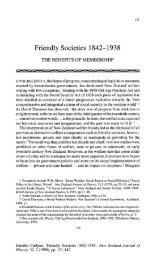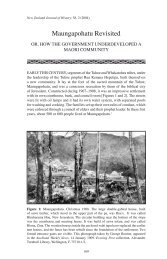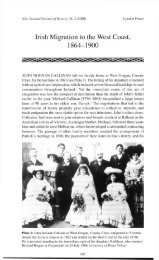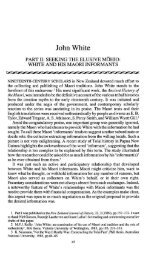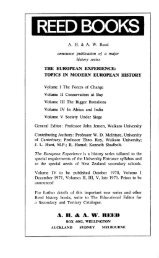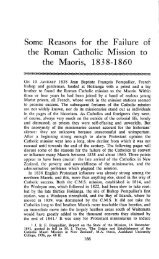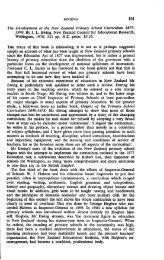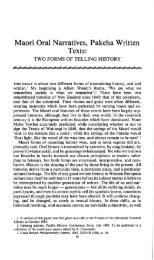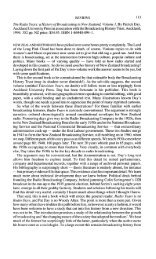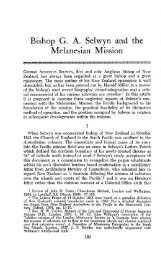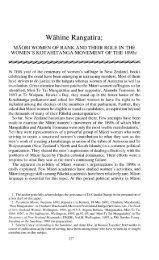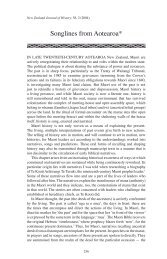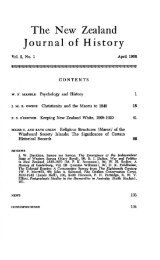New Zealand and the Mau in Samoa - New Zealand Journal of History
New Zealand and the Mau in Samoa - New Zealand Journal of History
New Zealand and the Mau in Samoa - New Zealand Journal of History
You also want an ePaper? Increase the reach of your titles
YUMPU automatically turns print PDFs into web optimized ePapers that Google loves.
NEW ZEALAND AND THE MAU 101<br />
undercurrents <strong>of</strong> <strong>in</strong>trigue, a considerable dislocation <strong>of</strong> political <strong>and</strong><br />
ceremonial life, <strong>and</strong> mellow<strong>in</strong>g memories <strong>of</strong> good old days when chiefs . . .<br />
were all-powerful'. 25<br />
When <strong>New</strong> <strong>Zeal<strong>and</strong></strong>ers arrived dur<strong>in</strong>g <strong>the</strong> Great War with <strong>the</strong>ir democratic<br />
heritage <strong>and</strong> conviction <strong>of</strong> '<strong>Samoa</strong> for <strong>the</strong> <strong>Samoa</strong>ns', <strong>the</strong>y immediately set<br />
about giv<strong>in</strong>g <strong>the</strong> <strong>Samoa</strong>ns political experience. They lit a fuse by not<br />
recogniz<strong>in</strong>g that <strong>Samoa</strong>ns were already politically experienced; <strong>the</strong>y <strong>the</strong>refore<br />
failed to recognize that German policy had been to ext<strong>in</strong>guish a political<br />
tradition which had hi<strong>the</strong>rto made <strong>Samoa</strong> ungovernable. Instead, <strong>the</strong> <strong>New</strong><br />
<strong>Zeal<strong>and</strong></strong>ers assumed that <strong>Samoa</strong>ns were to be prepared for future selfgovernment,<br />
<strong>and</strong> immediately began <strong>the</strong> process <strong>of</strong> tutelage, even before <strong>the</strong><br />
end <strong>of</strong> <strong>the</strong> war. In o<strong>the</strong>r words, far from <strong>in</strong>troduc<strong>in</strong>g <strong>the</strong> idea <strong>of</strong> politics to <strong>the</strong><br />
<strong>Samoa</strong>ns, as <strong>the</strong>y thought <strong>the</strong>y were do<strong>in</strong>g, <strong>the</strong>y removed <strong>the</strong> lid which Solf<br />
had striven, with much effort, to hold down. <strong>Samoa</strong>ns, feel<strong>in</strong>g <strong>the</strong> pressure<br />
ease, immediately took advantage <strong>of</strong> <strong>the</strong> revived opportunities to resume <strong>the</strong>ir<br />
former practices <strong>and</strong> began to destabilise <strong>the</strong> regime. 26<br />
It could hardly be expected that <strong>New</strong> <strong>Zeal<strong>and</strong></strong> <strong>of</strong>ficials would have <strong>the</strong><br />
background knowledge which <strong>the</strong> Germans had accumulated dur<strong>in</strong>g <strong>the</strong>ir<br />
contest for power with <strong>the</strong> <strong>Samoa</strong>n chiefs. Logan treated <strong>the</strong> fautua <strong>and</strong> <strong>the</strong><br />
Fono <strong>of</strong> Faipule as genu<strong>in</strong>e advisory bodies, whereas Solf had <strong>in</strong>tended <strong>the</strong>m<br />
merely to deflect <strong>Samoa</strong>n ambitions <strong>and</strong> to be a means <strong>of</strong> manag<strong>in</strong>g <strong>the</strong><br />
<strong>Samoa</strong>ns. Logan treated both groups with respect, <strong>and</strong> as vacancies occurred<br />
<strong>in</strong> <strong>the</strong> fono he accepted nom<strong>in</strong>ations by <strong>the</strong> faipules <strong>the</strong>mselves without<br />
<strong>in</strong>terfer<strong>in</strong>g, though he regarded it as unsatisfactory. 27 All <strong>the</strong> same, <strong>the</strong> fono<br />
had no real power, but Logan evidently sought its advice, <strong>and</strong> formed <strong>the</strong><br />
impression that <strong>Samoa</strong>ns were content with <strong>New</strong> <strong>Zeal<strong>and</strong></strong> rule, until <strong>the</strong><br />
<strong>in</strong>fluenza epidemic which brought about a complete change <strong>of</strong> attitude. 28<br />
With <strong>the</strong> re-establishment <strong>of</strong> civil rule under Tate, <strong>the</strong> Fono <strong>of</strong> Faipule<br />
began to manoeuvre for greater status <strong>and</strong> power. There were two issues<br />
<strong>in</strong>volved: one was <strong>the</strong> natural desire <strong>of</strong> chiefs to assume more power <strong>and</strong><br />
recognition than <strong>the</strong>y had under <strong>the</strong> present regime, 29 <strong>and</strong> <strong>the</strong> second was <strong>the</strong><br />
susceptibility <strong>of</strong> <strong>the</strong> faipule <strong>in</strong>dividually to <strong>in</strong>formation fed <strong>the</strong>m by white<br />
settlers which was not always friendly to <strong>the</strong> government. 30 Tate tried to fend<br />
<strong>of</strong>f <strong>the</strong>se dangers first by resum<strong>in</strong>g <strong>the</strong> authority, which lapsed under Logan,<br />
<strong>of</strong> nom<strong>in</strong>at<strong>in</strong>g new members himself, <strong>and</strong> second by tak<strong>in</strong>g <strong>the</strong> fono <strong>in</strong>to his<br />
confidence. In December 1921 he began meet<strong>in</strong>g with <strong>the</strong> fono ra<strong>the</strong>r than<br />
communicat<strong>in</strong>g with it formally, as had been <strong>the</strong> former custom, <strong>and</strong> found <strong>the</strong><br />
faipule <strong>in</strong>telligent <strong>and</strong> <strong>in</strong>terested <strong>in</strong> government, <strong>and</strong> capable <strong>of</strong> be<strong>in</strong>g useful<br />
25 Kees<strong>in</strong>g, p.94.<br />
26 Albert Wendt, 'Guardians <strong>and</strong> Wards'. MA <strong>the</strong>sis, Victoria University <strong>of</strong> Well<strong>in</strong>gton, 1965.<br />
Eteuati, pp. 19-30, 37.<br />
27 Report by Logan, 8 July 1919, IT1 Exl/10.<br />
28 Ibid. Tate reported on 8 March 1919 that <strong>the</strong> <strong>Samoa</strong>ns esteemed Logan highly. Army<br />
Department (AD) 35 56/58/77.<br />
29 Tate to Capta<strong>in</strong> Waldo Evans, 22 February 1921, IT 1 Ex2/9.<br />
30 Tate, Confidential Report, 10 April 1922, IT 1 Ex2/ll.



